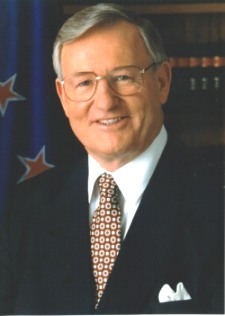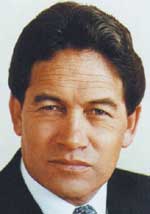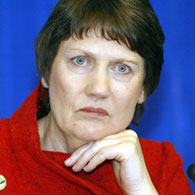


Chris Trotter’s curious comment in his latest column that Helen Clark and Jim Bolger are more similar than either is to Don Brash is not far from the truth. After all, both Clark and Bolger are political whores par excellence. If we look at both their political careers they have actively been a part of some of the most authoritarian and liberalising governments in recent history.
*
Helen Clark was Minister of Health in the late 1980s – when hospitals were being closed because of the archaic duplication of facilities across the country, and the health system was starting to face up to a structure reminiscent of the worst local authorities. Mental health was the poor cousin, as nobody got elected to hospital boards promising to increase funding for it. Clark was part of the beginning of the Rogernomics revolution on health care that meant that hospital boards couldn’t keep asking for more money without accountability for what was being bought. Clark was also in Cabinet when Telecom, PostBank and Air New Zealand were privatised, and also when it agreed to implement a flat tax. No doubt she held personal reservations about much of this, but in agreeing to be in Cabinet and a Minister, she wasn’t just a backbencher loyally supporting her party – she was in a position of power, part of the Rogernomics revolution and was widely loathed as small hospitals saw their range of services reduced. She succeeded Mike Moore as leader in 1993 with what has been described as a “Maoist” type of coup, and then worked hard to win the 1996 election.
*
Jim Bolger was Minister of Labour in the latter days of the Muldoon government. To his credit he supported voluntary unionism (repealed by Labour, reinstated in the Employment Contracts Act and not repealed by Labour), but he was also in Cabinet while Think Big was being progressed, wage/price freezes, interest rate regulations and continued growth in subsidies. Bolger supported one of the most leftwing interventionist governments in recent history, he was a part of it. After his election as PM in 1990 he led a government that continued Rogernomics, with further privatisations (NZ Rail, BNZ, Radio NZ commercial networks), reductions in state spending, structural reform of the health sector, reductions in welfare. The liberalising policies also saw Bolger fall out with Winston Peters, and start the process of electoral reform with referenda on change options and ultimately MMP itself.
*
The 1996 election showed the country what Bolger and Clark are all about. With National roughly maintaining its share of the vote at 33%, Labour’s vote collapsed to 28%, as the “talkback idiot” factor saw NZ First and the Alliance pull in as strong third and fourth parties. National needed NZ First to govern, ACT and United would not be enough. Labour needed NZ First to govern too, as the Alliance was not enough. So after the election, Winston looked like the cat who got the cream, and Bolger and Clark – both whom loathed Winston and his pandering to anti-Asian racism, started strutting their stuff in meetings with him like common K-Road whores.
*
Ultimately it was Bolger who Winston screwed, one reason being that while he could have screwed Clark, he also needed Anderton there watching, and that was less than appealing.
*
Indeed, Clark and Bolger have a lot in common – they were both desperate for power at any cost. Bolger could have walked away from it all and said – no – the National Party supports immigration and does not pander to populist nationalist politics (or some monosyllabic grunt that the talkback demeritocracy understands). So could have Clark. No.
*
Of course, as we all know, Bolger’s marriage with Winston didn’t last and the Nats paid the price in 1999, with Clark storming in with Anderton (and the Greens) to govern.
*
In 2005 it was different. National not only could not govern with a ragtag mob of United Future, NZ First, ACT and the Maori Party, but Don Brash had campaigned on NOT entering into government with Winston Peters. He was never tested as to whether he actually would have. Clark, by contrast, could have governed without Winston Peters, and had a choice of support from the Greens and/or the Maori Party instead, but she actively sought out Winston Peters – the man who continues to get support for either playing the “foreigners are dangerous” card or being Maori, and formed a confidence and supply agreement with him.
*
This all makes a mockery of the sort of drivel that says that National wants power at any price – Labour is at least as bad and has been willing to sell out immigrant New Zealanders by giving Winston his baubles of power and appointing him Minister of Foreign Affairs, even when it didn't need to.
*
Helen Clark was Minister of Health in the late 1980s – when hospitals were being closed because of the archaic duplication of facilities across the country, and the health system was starting to face up to a structure reminiscent of the worst local authorities. Mental health was the poor cousin, as nobody got elected to hospital boards promising to increase funding for it. Clark was part of the beginning of the Rogernomics revolution on health care that meant that hospital boards couldn’t keep asking for more money without accountability for what was being bought. Clark was also in Cabinet when Telecom, PostBank and Air New Zealand were privatised, and also when it agreed to implement a flat tax. No doubt she held personal reservations about much of this, but in agreeing to be in Cabinet and a Minister, she wasn’t just a backbencher loyally supporting her party – she was in a position of power, part of the Rogernomics revolution and was widely loathed as small hospitals saw their range of services reduced. She succeeded Mike Moore as leader in 1993 with what has been described as a “Maoist” type of coup, and then worked hard to win the 1996 election.
*
Jim Bolger was Minister of Labour in the latter days of the Muldoon government. To his credit he supported voluntary unionism (repealed by Labour, reinstated in the Employment Contracts Act and not repealed by Labour), but he was also in Cabinet while Think Big was being progressed, wage/price freezes, interest rate regulations and continued growth in subsidies. Bolger supported one of the most leftwing interventionist governments in recent history, he was a part of it. After his election as PM in 1990 he led a government that continued Rogernomics, with further privatisations (NZ Rail, BNZ, Radio NZ commercial networks), reductions in state spending, structural reform of the health sector, reductions in welfare. The liberalising policies also saw Bolger fall out with Winston Peters, and start the process of electoral reform with referenda on change options and ultimately MMP itself.
*
The 1996 election showed the country what Bolger and Clark are all about. With National roughly maintaining its share of the vote at 33%, Labour’s vote collapsed to 28%, as the “talkback idiot” factor saw NZ First and the Alliance pull in as strong third and fourth parties. National needed NZ First to govern, ACT and United would not be enough. Labour needed NZ First to govern too, as the Alliance was not enough. So after the election, Winston looked like the cat who got the cream, and Bolger and Clark – both whom loathed Winston and his pandering to anti-Asian racism, started strutting their stuff in meetings with him like common K-Road whores.
*
Ultimately it was Bolger who Winston screwed, one reason being that while he could have screwed Clark, he also needed Anderton there watching, and that was less than appealing.
*
Indeed, Clark and Bolger have a lot in common – they were both desperate for power at any cost. Bolger could have walked away from it all and said – no – the National Party supports immigration and does not pander to populist nationalist politics (or some monosyllabic grunt that the talkback demeritocracy understands). So could have Clark. No.
*
Of course, as we all know, Bolger’s marriage with Winston didn’t last and the Nats paid the price in 1999, with Clark storming in with Anderton (and the Greens) to govern.
*
In 2005 it was different. National not only could not govern with a ragtag mob of United Future, NZ First, ACT and the Maori Party, but Don Brash had campaigned on NOT entering into government with Winston Peters. He was never tested as to whether he actually would have. Clark, by contrast, could have governed without Winston Peters, and had a choice of support from the Greens and/or the Maori Party instead, but she actively sought out Winston Peters – the man who continues to get support for either playing the “foreigners are dangerous” card or being Maori, and formed a confidence and supply agreement with him.
*
This all makes a mockery of the sort of drivel that says that National wants power at any price – Labour is at least as bad and has been willing to sell out immigrant New Zealanders by giving Winston his baubles of power and appointing him Minister of Foreign Affairs, even when it didn't need to.
No comments:
Post a Comment